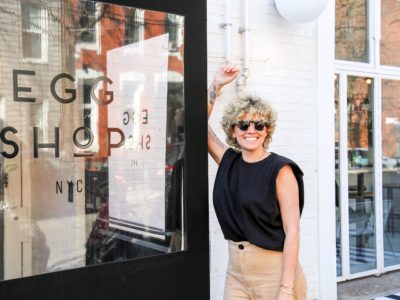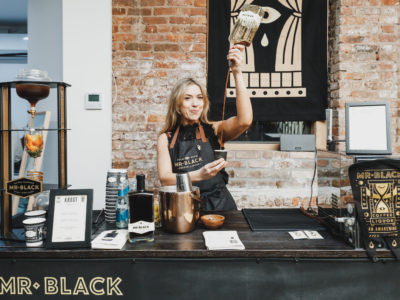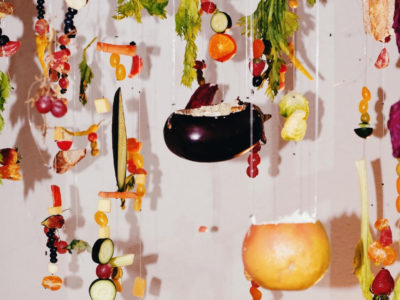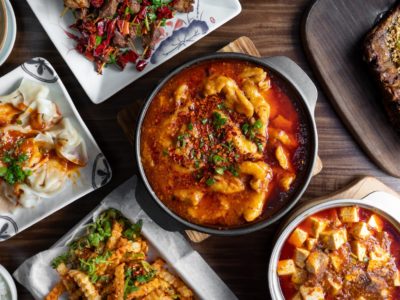Michael Voltaggio, Chef + Restaurateur
Michael Voltaggio, Chef + Restaurateur

From cooking at the Holiday Inn at 15-years-old to opening Ink six years ago, Michael Voltaggio isn’t afraid of a little hard work and evolution. The Top Chef winner also isn’t showing any signs of stopping soon: he’s opening a new restaurant in Miami later this year and working on another cookbook, all while refining and reinventing Ink every day.
Michael Voltaggio: On Ink, Dining In Los Angeles, Top Chef, and More
We sat down with Michael Voltaggio, one of our favorite tattoo-covered Los Angeles chefs and restauranteurs, on a sunny day on Melrose to discuss moving out on his own at 16, the perks and disadvantages of being on television, and what's up next at Ink.
You recently revamped the menu at Ink to include steakhouse-inspired dishes. Tell me a little bit more about why you added these items.
The goal initially was to just do research and development for the steakhouse, Voltaggio Brothers Steakhouse, I opened with my brother Bryan on the east coast. So as we started testing recipes and I started asking questions like, “Why don’t we serve that here? Why don’t we serve this here?” Then it just became a bigger conversation about defining what the restaurant is. When people ask what Ink is, it’s one of the hardest questions for us to answer. It’s not an Italian restaurant, it’s not a Chinese restaurant, it’s not an Indian restaurant, it’s not a Spanish restaurant—it’s kind of an American restaurant, but we’ve got soy sauce and we incorporate recipes from all over the world into the food we cook, so what is this restaurant? That question became more important across the board, and I felt like what we were was a collection of small dishes that are definitely chef-driven, but where’s the guest-driven sort of part of this? That’s where the steakhouse influence came from. At the end of the day, we wanted to have something that if you came into this restaurant and needed to put your finger on what it was, we wanted to be able to say it’s “this.” And so, for the time being, it’s the style of food that we’ve been doing at Ink for 6 years with a huge meat-centric aspect of the menu.
Ink’s 6th anniversary is this year—what does that feel like?
It’s crazy. To be in Los Angeles for more than two years and still be relevant is a huge compliment to our staff, but more importantly to our customers that have been loyal in supporting the restaurant. The restaurant business in LA is very transient and a lot of it has to do with trend, but also that night club mentality or the newest thing you can experience. I think you have to continue not to reinvent yourself, but to stay fresh and not just be complacent or satisfied with where you are, especially in this city.
Tell me about that moment six years ago when you first opened the doors. What did that feel like?
Well, I mean, we were busy! But we were busy because we were new. We’re cooking the best food today we’ve cooked in six years, but we were busier six years ago. My question to the diners is: “Why were you here? Because today is our best food and our best service. A lot of times with restaurants, people are like, “Oh that place has been around for years, I don’t need to go there.” But that means they have years of experience and I think there’s something to say for that. I think that diners should be a little more strategic in their restaurant selection because if a restaurant’s good the first year, imagine how great it’s going to be after year six.
Taking it back a little, I read that you really started cooking around 15, did you always love to cook?
No, I was a super picky eater and I didn’t like food at all actually. I liked playing with it, but I didn’t like eating it—and so, I think that I played with it more to the point of where I’d like it. So then I would be creating things that I thought, if I would like, then they would like too—for instance, a vegetable that I didn’t like, then people that liked it before that would love it after I made it in the way that I liked it for myself.
So where did you start cooking at 15?
To be honest, my brother and I started together at a Holiday Inn in Frederick, Maryland. It was an after school job. I moved out of my house around 16 years old, so I was paying rent and going to high school, basically living as an adult when I was in the eleventh grade. And so cooking originally was just about working and survival, I had to get a job, so I got a job. But then I found myself, of all the things I did throughout the day—going to school, going to football practice, hanging out with my friends, and going to work—the work part of it was the part that I was enjoying the most, which is weird to think for a 15-16-year-old shit head.
My brother and I started together at a Holiday Inn in Frederick, Maryland. It was an after school job. I moved out of my house around 16 years old, so I was paying rent and going to high school, basically living as an adult when I was in the eleventh grade. And so cooking originally was just about working and survival, I had to get a job, so I got a job.
After cooking there, what was the next step?
I went to a country club. When I applied for the job, the guy was actually recruiting my brother, but my brother had moved out of state and I intercepted the phone call and I was just like, “No sorry he’s already gone, but I’ll take the job!” And the guy was like, “Well what do you want to do? And I said, “Well honestly I want to go to culinary school in a year and I need to save up my money” and I was 18-years-old at the time. He said, “Listen, work for me for a year, if you want to go to school great, I’ll help you get into the culinary college” or I could do this apprenticeship at a hotel called The Greenbrier, and I said, “Okay, that’s interesting.” Sure enough, a year later, I went back to him and he got me into The Greenbrier which is an old European-style culinary apprenticeship on the east coast in a building that is 100+ years old.
I learned classic methods of cooking from people that were classically trained. That continues to this day, the hotel still does giant pots full of stocks and is a butcher shop and a pastry shop, and it’s in the middle of nowhere so they really have to produce everything for themselves. There isn’t a local fish butcher, there isn’t a local baker, there isn’t a local anything—everything is over 150 miles away, so they produce everything in-house.
Do you miss that kind of simplicity in cooking? Or do you really enjoy in the midst of Los Angeles?
I’m still doing it. I think the same discipline and the same techniques go into the food that we cook here, we just put different twists and tricks and stuff on top of it. The foundation of my cooking and the cooking here in the restaurant is very classic. We roast bones, we do sauces everyday, we do our own butchery. We do all of those things, I think that we just punctuate the end of the sentence a little bit differently.
So what happened after that?
I worked at the Ritz-Carlton Hotel Company and back in 2000-2002 is when I started cooking sous-vide, and when I was really exposed to modern French cooking, which, back then was modern cooking. The French were leading the charge in what was modern fine dining cuisine. Jean-Georges and Daniel Boulud, these were the restaurants everyone was going to and are still going to today and so it’s a style of food that I’m glad I was exposed to because it’s probably the one that influenced my career the most, but also the one that I think sustained itself and is still the most relevant today.
So what brought you to Los Angeles?
José Andrés. José Andrés brought me to Los Angeles. He called me, his team reached out. They called and said, “We’re opening a restaurant in Los Angeles, we got your name from a pastry chef mutual friend of ours, long story short, we want you to come make lunch for José.”
So I drove to DC, cooked lunch for José and his team, and José said to me, “I really appreciate the fact that you cook this style of cuisine, why don’t you come work for us so we can teach you how to cook it properly?” And I was like, “Ok!” He was right, I was just kind of blind teaching myself this modern food. José’s career is very much built on classic Spanish cuisine and so all the modern stuff that José does is built on a very deep-rooted classic Spanish cooking discipline and tradition. So I said, “Okay this is the type of chef I want to be,” I wanted to keep all those classic disciplines that I have, but just twist them, change the cover a little bit, put a different shade of lipstick on it the next day. Just kind of manipulate it, but still the interior of it, what’s behind the mask is still the same—and I thought José was brilliant at that. I thought I was interviewing to be the chef of Saam, which is the smaller restaurant in the back of The Bazaar, and that was a restaurant that was gonna do up to 40 people a night. And José was like, “Congratulations, you’re going to be the chef of The Bazaar!” and I said, “Ok, but I’ve never been in charge of a restaurant that cooks for that many people” and he goes, “it’s fine.”
José Andrés said to me, 'I really appreciate the fact that you cook this style of cuisine, why don’t you come work for us so we can teach you how to cook it properly?'
And so after that, when did you decide that you wanted to open up your own space?
After I left Bazaar, I left to go do Top Chef and so when I got back from that I didn’t want to be standing in an open kitchen in somebody else’s restaurant. I felt like it was disrespectful to José because I didn’t want people coming up to me in his restaurant like, “Hey I saw you on TV, can I take a picture with you?” So I resigned to go figure out what I wanted to do, and that’s when The Langham Hotel in Pasadena called and the position of dining room chef opened up which was a one-star Michelin restaurant at the time. For me, I felt like that was a good place to go to focus only on cooking for a while, be in Pasadena which is still very much a place where people appreciate food, but it’s not in the center of Los Angeles. That’s when I also started writing the content for the cookbook that we put out. After a year of being there, I received a phone call with an opportunity to open this restaurant from a man named Michael Ovitz, who is a very big deal in Los Angeles, and I went and met with him at his house and thought, “Here I am meeting with this business man, this master of negotiation, there’s no way I’m gonna even get through this meeting.” But what happened there that was awesome—he’s a fan of art and artists and I slowly recognized that he wasn’t in this for a business venture, he was in it to support an artist and that’s how we became partners.
Touching on the TV factor, do you feel that was an advantage and disadvantage?
Whenever you do a TV show like that, you become “that guy from that TV show.” The difference between me and a lot of other people that expose themselves to a situation like that is, I was already established as a chef before I went and did that. So my goal was to bridge the gap between chefs and chefs that just play chefs on TV. I felt like there was a lot of opportunity there, but it was risky, it still is risky. But it’s opened up so many more doors for chefs. Chefs that, 10 years ago would say, “there’s no way I’d ever do TV,” would reconsider that today because, I hate to say it, it brings opportunity outside of the kitchen too. And it allows chefs to have a bigger platform to do more things than cook food for people every single day. Whether it’s charity, whether it’s lifestyle and stuff—I mean, I’ve travelled the world because of cooking, I’ve gotten to play a journalist, I’ve gotten to do scripted television, I’ve gotten to speak at book festivals, I’ve gotten to address the YPO. I’m a CEO, I’m human resources, I’m a lawyer—I mean chefs always say that, but I really am all those things. I just felt like that platform is one that people should consider because it does help move things a little bit faster.
My goal was to bridge the gap between chefs and chefs that just play chefs on TV, and so I felt like there was a lot of opportunity there. It was risky, it still is risky, because people then associate you with being that guy from TV—but I think it’s opened up so many more doors for chefs.
As far as just kind of having all those facets, I know you also are heavily involved in No Kid Hungry, can you tell me a little bit about that?
Yeah! For me it’s simple—we’re chefs and we want to feed people, No Kid Hungry wants to feed children because 1 in every 4 kids doesn’t know where their next meal’s coming from. For me, that’s where I felt like I could make an impact. I cook for people that get to eat, why not do something for people that need to eat?
I love that. What’s next, are you doing another cookbook?
Bryan and I are starting to work on ideas for a book now. He wrote one on his own. To be honest, it’s easier to write one with someone else because the deadlines are really hard to hit and to fill a whole book with two people’s recipes versus filling a book with one person’s recipes is a lot easier. But also, the last restaurant that we opened, and the next restaurant that’s opening are both partnerships between Bryan and I. And we’re opening a restaurant in Miami—we’re always coming up with new food. At the end of the day it doesn’t matter which restaurant it ends up in, the ideas are still being generated and you just need to keep creating. I need to have projects all the time, even if the project is just doing a spring menu roll out at Ink. We always need to have projects and continue to evolve.










